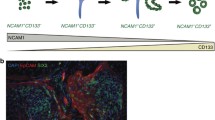Abstract
The number of kidney transplantations performed per year is limited due to availability of donor organs. One possible solution to the organ shortage is the use of renal xenografts. However, the transplantation of xenografts is complicated by hyperacute and acute rejection. It has been postulated that the host immune response might be attenuated following the transplantation of renal precursor cells or embryonic kidneys (metanephroi) instead of developed (adult) kidneys. Transplanted metanephroi become chimeric organs in that their blood supply originates, at least in part, from the host. It is possible to transplant a developing metanephros, without the use of immunosuppression, from one rat to another. Transplanted metanephroi grow, develop, become vascularized, and function in host rats. Transplantation of metanephroi may be a promising novel therapeutic approach for the treatment of chronic renal failure.
Similar content being viewed by others
Author information
Authors and Affiliations
Additional information
Received: 29 December 1999 / Revised: 13 March 2000 / Accepted: 13 March 2000
Rights and permissions
About this article
Cite this article
Hammerman, M. Transplantation of renal precursor cells: a new therapeutic approach. Pediatr Nephrol 14, 513–517 (2000). https://doi.org/10.1007/s004670050805
Issue Date:
DOI: https://doi.org/10.1007/s004670050805




